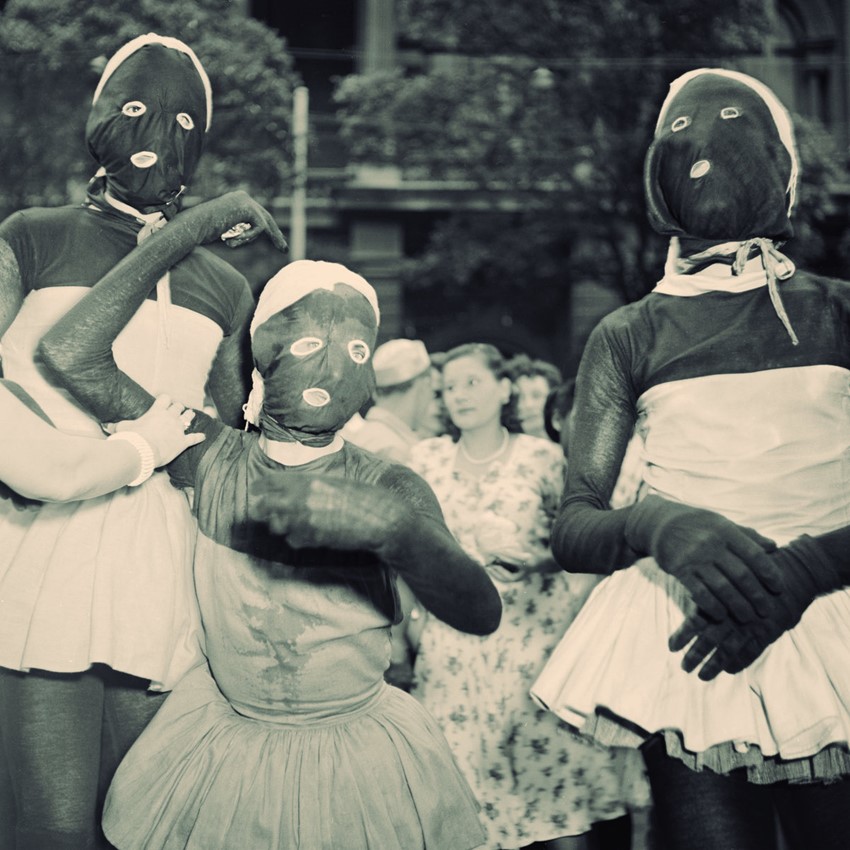Tuesday, November 5, 2019
Why does ‘ethnic’ nearly always mean non-white?
Following her review of an album with a shocking blackface cover, Gabrielle Messeder delves into problematic representation in world music...

This column was inspired by a CD I reviewed in the July issue, #149. When I first read the title, Brazil Primitivo, I rolled my eyes. I was expecting to receive an uninspiring, clichéd samba compilation – nothing new there – but the reality was far more sinister. When the CD arrived, I was rendered speechless by the cover artwork: a monochrome photograph of three dancing figures, each wearing a black bodysuit, with a light-coloured dress on top. Their outfits were finished off with a black hood over each face, with crude, white-rimmed holes for the eyes and mouth. The gap between hood and bodysuit revealed a slither of white neck, and a white woman wearing a pearl necklace and a 1940s-style flowery tea dress stands in the background. A white hand, with a pearl bracelet and diamond ring, grabs at one of the black-wrapped arms. There is no title or text, nor is there a photo credit to be found on the press release.
A little digging reveals that the photograph was taken by American photographer Earl Leaf, at the Rio de Janeiro carnaval festivities of 1953. Taken as a whole, Leaf’s photo series illuminates the racist attitudes present in the city at the time – blackface performance being an obvious example – but also, how the day-to-day rules of social segregation partially collapsed during carnaval, as shown in the photographs of upper-class white women dancing with lower-class black men. But, minus this crucial contextual information, the album cover is simply crude blackface. It is unclear exactly what point the image is supposed to make, aside from grotesquely pointing out that the music on the compilation was written and performed by non-white musicians.

The cover of Brazil Primitivo, Vol 1
Although images like this are, thankfully, rare in today’s music industry, the wording used to describe the music isn’t. Brazil Primitivo is one title of many that features colonial, racist language. Quoting from the Oxford English Dictionary, ‘primitive’ means ‘very basic or unsophisticated,’ or ‘denoting a simple, naive style of art that deliberately rejects sophisticated artistic techniques.’ Synonyms include crude, simple, rough, basic, undeveloped, unrefined: words that were used to describe non-white populations in the ‘global South’ and justify their colonisation and enslavement. Defining non-white peoples or cultures in this manner is not confined to the domain of history books and the propaganda of far-right politicians; these attitudes have long been present in the study and promotion of music. In the introduction to his book, Primitive Music: An Inquiry into the Origin and Development of Music, Songs, Instruments, Dances, and Pantomimes of Savage Races, first published in 1893, the Austrian musicologist Richard Wallaschek wrote the following:
‘It is with music as with language: however far we might descend in the order of primitive people, we should probably find no race which did not exhibit at least some trace of musical aptitude… In fact it would appear that among races of the very lowest order of civilisation there are frequently to be found some which have more musical capacity than many of a higher order.’
The sentiments expressed by Wallaschek are still prevalent in certain corners of the music industry, and Western-centric attitudes still filter through into the language we sometimes use to talk about non-Western music. Since the rise of the ‘world music’ industry, from the late 1980s, and the subsequent commercialisation of non-Western musics, certain marketing language and terminology has become prevalent, and this language subtly (or not so subtly) implies views that chime in with those expressed by Dr Wallaschek. Although their usage has long been deemed inappropriate by music academics (debates surrounding the arguably problematic usage of the term ‘ethnomusicology’ notwithstanding), words like ‘tribal’ and ‘ethnic’ are still regularly used on CD covers, in reviews, and in adverts for concerts and festivals. The problem with these words is that all too often they are solely used to describe music of non-white origin. Why does ‘ethnic’, a word denoting national or cultural heritage, nearly always mean non-white? Implicit in the use of these words is the idea that white, Euro-American or ‘Western’ music is the global default – the norm – and everyone and everything else is ‘other’ and ‘foreign’. Words like ‘ethnic’, when used to describe compilation CDs, gloss over the diversity of entire continents, creating an artificial divide between the West and the rest, denying centuries of cross-cultural mixing. It is not as simple as ‘us’ and ‘them’, nor has it ever been.
Whereas ‘tribal’ is often a prefix to ‘-house’, or a description for some well-meaning hippy playing an old djembé (and calling it a bongo), it is frequently used to describe any music of the non-white world with an emphasis on percussion. ‘Tribal’ has clear connotations of primitivism and blackness. Indeed, one of the reasons that the early ethnomusicologists, like Wallaschek, called African music ‘primitive’ was because unlike sophisticated harmony-focused European music, many African genres and styles tended to have highly complex rhythmic concepts at their core, which the visiting researchers didn’t understand.
So, given this bloody, racist history, why are record labels still using this lazy language to promote non-white music? Paradoxically, consumers of world music are often associated with tolerance and radical politics, yet the marketing language of non-white music is all too often demonstrative of far less progressive attitudes. Before people jump down my throat and accuse me of banning words, let me clarify – all I am suggesting is that we (white musicians, writers, journalists, music industry workers) should question the language we use when describing (and selling) the music of the world. Although much has improved, the fact that albums like Brazil Primitivo are still being released suggests that we have a long way still to go.
About Gabrielle: A PhD student, writer and musician, Gabrielle spends her time either playing Brazilian music in London, listening to samba de raiz or researching the Brazilian music scene in Lebanon.
This article originally appeared in the November 2019 issue of Songlines. Never miss an issue – subscribe today!

